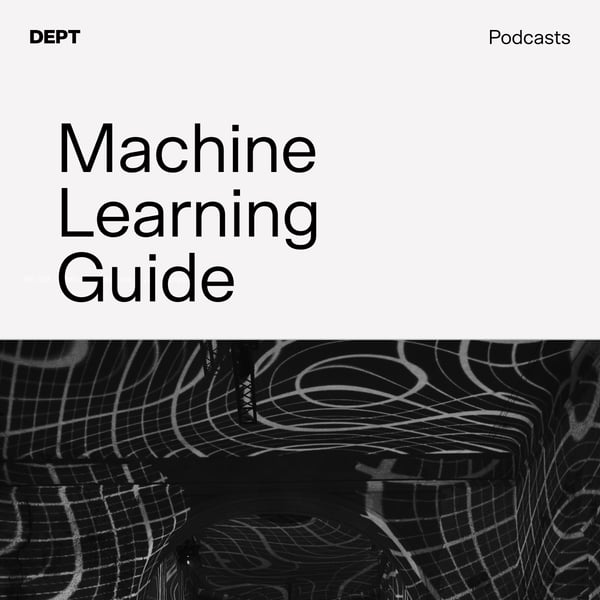MLG 002 What is AI, ML, DS
Machine Learning Guide
OCDevel
4.9 • 848 Ratings
🗓️ 9 February 2017
⏱️ 64 minutes
🧾️ Download transcript
Summary
Support my new podcast: Lefnire's Life Hacks
Show notes at ocdevel.com/mlg/2
Updated! Skip to [00:29:36] for Data Science (new content) if you've already heard this episode.
What is artificial intelligence, machine learning, and data science? What are their differences? AI history.
Hierarchical breakdown: DS(AI(ML)). Data science: any profession dealing with data (including AI & ML). Artificial intelligence is simulated intellectual tasks. Machine Learning is algorithms trained on data to learn patterns to make predictions.
Artificial Intelligence (AI) - Wikipedia
Oxford Languages: the theory and development of computer systems able to perform tasks that normally require human intelligence, such as visual perception, speech recognition, decision-making, and translation between languages.
AlphaGo Movie, very good!
- Reasoning, problem solving
- Knowledge representation
- Planning
- Learning
- Natural language processing
- Perception
- Motion and manipulation
- Social intelligence
- General intelligence
Applications
- Autonomous vehicles (drones, self-driving cars)
- Medical diagnosis
- Creating art (such as poetry)
- Proving mathematical theorems
- Playing games (such as Chess or Go)
- Search engines
- Online assistants (such as Siri)
- Image recognition in photographs
- Spam filtering
- Prediction of judicial decisions
- Targeting online advertisements
Machine Learning (ML) - Wikipedia
Oxford Languages: the use and development of computer systems that are able to learn and adapt without following explicit instructions, by using algorithms and statistical models to analyze and draw inferences from patterns in data.
Data Science (DS) - Wikipedia
Wikipedia: Data science is an interdisciplinary field that uses scientific methods, processes, algorithms and systems to extract knowledge and insights from noisy, structured and unstructured data, and apply knowledge and actionable insights from data across a broad range of application domains. Data science is related to data mining, machine learning and big data.
History
- Greek mythology, Golums
- First attempt: Ramon Lull, 13th century
- Davinci's walking animals
- Descartes, Leibniz
-
1700s-1800s: Statistics & Mathematical decision making
- Thomas Bayes: reasoning about the probability of events
- George Boole: logical reasoning / binary algebra
- Gottlob Frege: Propositional logic
- 1832: Charles Babbage & Ada Byron / Lovelace: designed Analytical Engine (1832), programmable mechanical calculating machines
-
1936: Universal Turing Machine
- Computing Machinery and Intelligence - explored AI!
- 1946: John von Neumann Universal Computing Machine
- 1943: Warren McCulloch & Walter Pitts: cogsci rep of neuron; Frank Rosemblatt uses to create Perceptron (-> neural networks by way of MLP)
-
50s-70s: "AI" coined @Dartmouth workshop 1956 - goal to simulate all aspects of intelligence. John McCarthy, Marvin Minksy, Arthur Samuel, Oliver Selfridge, Ray Solomonoff, Allen Newell, Herbert Simon
- Newell & Simon: Hueristics -> Logic Theories, General Problem Solver
- Slefridge: Computer Vision
- NLP
- Stanford Research Institute: Shakey
- Feigenbaum: Expert systems
- GOFAI / symbolism: operations research / management science; logic-based; knowledge-based / expert systems
- 70s: Lighthill report (James Lighthill), big promises -> AI Winter
-
90s: Data, Computation, Practical Application -> AI back (90s)
- Connectionism optimizations: Geoffrey Hinton: 2006, optimized back propagation
- Bloomberg, 2015 was whopper for AI in industry
- AlphaGo & DeepMind
Transcript
Click on a timestamp to play from that location
| 0:00.0 | Welcome back to Machine Learning Guide. I'm your host, Tyler Rinelli. |
| 0:05.0 | MLG teaches the fundamentals of machine learning and artificial intelligence. |
| 0:09.0 | It covers intuition, models, math, languages, frameworks, and more. |
| 0:13.0 | Where your other machine learning resources provide the trees, I provide the forest. |
| 0:18.0 | Visual is the best primary learning modality, but audio is a great supplement during exercise commute and chores. |
| 0:25.6 | Consider MLG your syllabus with highly curated resources for each episode's details at OCdevel.com forward slash MLG. |
| 0:35.6 | I'm also starting a new podcast which could use your support. |
| 0:39.6 | It's called Lefnear's Life Hacks and teaches productivity-focused tips and tricks, |
| 0:44.5 | some which could prove beneficial in your machine learning education journey. |
| 0:48.7 | Find that at OCDevelle.com forward slash LLH. |
| 0:53.8 | Machine Learning Guide, Episode 2, |
| 0:56.0 | this is What is Artificial Intelligence, Machine Learning, and Data Science? |
| 1:00.4 | This is a complete redo of the original episode. |
| 1:03.4 | So if you've already listened to Episode 2, I recommend listening to this anyway, |
| 1:07.3 | because there's going to be a lot of new information, especially regarding data science, |
| 1:11.3 | which was sorely lacking in the original recording. Let's start with a bird's eye view. Data |
| 1:17.7 | science is the all-encompassing umbrella term, inside of which is artificial intelligence, |
| 1:24.7 | inside of which is machine learning. So data science contains AI and AI contains ML. |
| 1:32.2 | But before we go into data science, let's actually start with artificial intelligence. |
| 1:37.4 | From Oxford Dictionary, AI means the theory and development of computer systems able to perform tasks that normally require |
| 1:46.1 | human intelligence, such as visual perception, speech recognition, decision making, and |
| 1:52.4 | translation between languages. So basically, AI is automated intelligence, automation of things |
... |
Please login to see the full transcript.
Disclaimer: The podcast and artwork embedded on this page are from OCDevel, and are the property of its owner and not affiliated with or endorsed by Tapesearch.
Generated transcripts are the property of OCDevel and are distributed freely under the Fair Use doctrine. Transcripts generated by Tapesearch are not guaranteed to be accurate.
Copyright © Tapesearch 2025.

